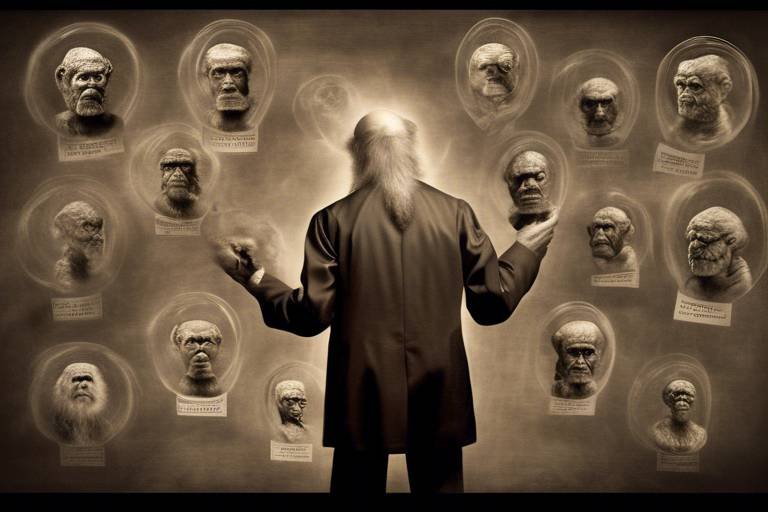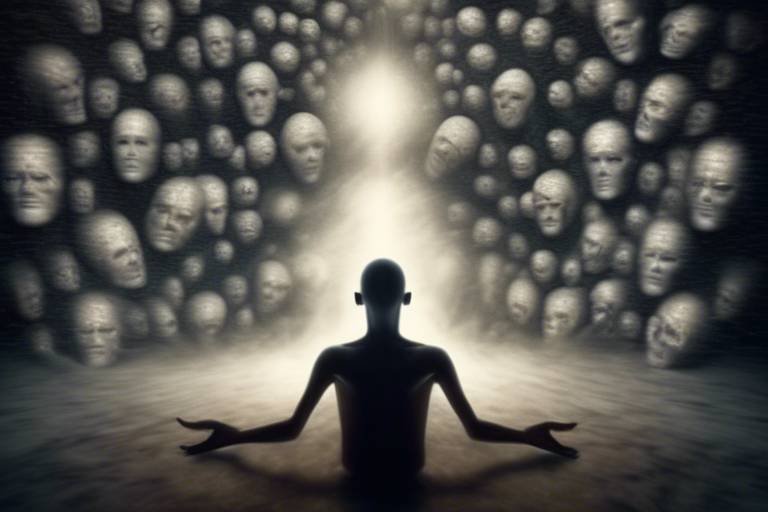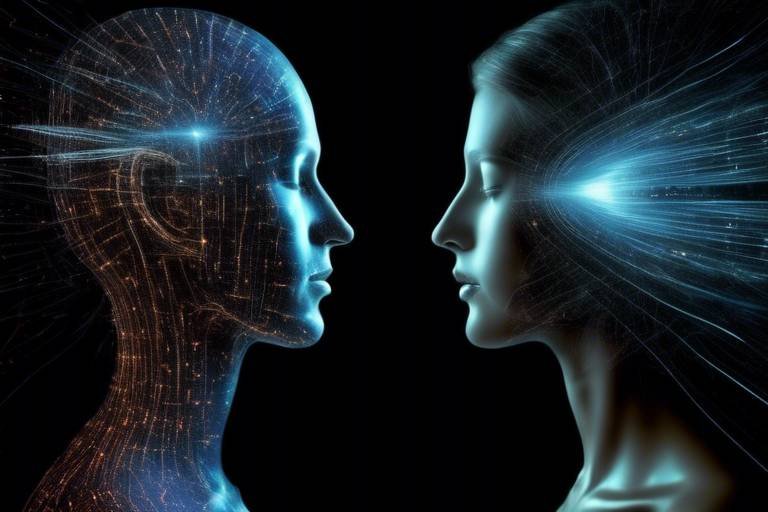Is Consciousness Unique to Human Beings?
Have you ever pondered the essence of consciousness and whether it is a trait solely belonging to humans? This question is not just a philosophical musing; it strikes at the very core of what it means to be alive and aware. Consciousness is a complex phenomenon that encompasses self-awareness, perception, and a myriad of cognitive processes. But is it truly unique to us, or does it extend into the animal kingdom?
To tackle this intriguing question, we need to dive into various perspectives ranging from scientific findings to philosophical implications. We will explore how consciousness is defined, its presence in non-human animals, and the neurological underpinnings that may connect us all. Additionally, we will delve into philosophical debates that have raged for centuries, examining arguments both for and against the idea that human consciousness is unique.
As we embark on this exploration, let's keep an open mind. After all, the notion that we might not be the only conscious beings in the universe can be both thrilling and unsettling. Could it be that the dolphins swimming in the ocean, the elephants roaming the savannah, or even the crows perched on our rooftops possess a form of consciousness? The answers may surprise you!
In the following sections, we will dissect the very fabric of consciousness, comparing it across species, and analyzing the implications of what we find. So, fasten your seatbelts as we journey into the depths of awareness and discover whether consciousness is indeed a uniquely human trait or a shared characteristic among many forms of life.
Understanding consciousness is essential to exploring its uniqueness. This section will define consciousness, examining its various aspects, including self-awareness, perception, and cognitive processes that contribute to our understanding of this complex phenomenon.
This section investigates consciousness in non-human animals. By examining behaviors, cognitive abilities, and neurological evidence, we aim to determine if consciousness is present in other species and how it compares to human consciousness.
We will analyze specific case studies showcasing remarkable intelligence in animals, such as dolphins and primates. These examples may provide insight into the potential for consciousness beyond human beings.
The ability to use tools and solve problems is often linked to consciousness. This subsection explores how various species demonstrate these skills, raising questions about their cognitive processes and awareness.
Social interactions and communication among animals can indicate levels of consciousness. This part examines how these behaviors reflect cognitive complexity and the potential for shared experiences in non-human species.
This section delves into the neurological underpinnings of consciousness. By analyzing brain structures and functions, we can better understand the biological basis of consciousness in both humans and animals.
Philosophers have long debated the nature of consciousness. This section will explore various philosophical viewpoints, including dualism, materialism, and panpsychism, to shed light on the uniqueness of consciousness.
We will discuss arguments that assert the uniqueness of human consciousness, focusing on aspects such as language, abstract thinking, and moral reasoning that may set humans apart from other species.
This part presents counterarguments that challenge the notion of human uniqueness, highlighting perspectives that suggest consciousness may exist on a spectrum across different life forms.
As science advances, our understanding of consciousness continues to evolve. This section discusses emerging research areas and technologies that may provide deeper insights into consciousness and its potential manifestations in various organisms.
- What is consciousness? Consciousness refers to the state of being aware of and able to think about one's own existence, thoughts, and surroundings.
- Do animals have consciousness? Many studies suggest that various animals exhibit signs of consciousness, though the degree and nature may differ from humans.
- How do scientists study consciousness? Scientists study consciousness through behavioral observations, neurological research, and cognitive tests across different species.
- What are the philosophical views on consciousness? Philosophical views vary widely, with perspectives including dualism, materialism, and panpsychism, each offering different insights into the nature of consciousness.

The Definition of Consciousness
Understanding consciousness is essential to exploring its uniqueness. But what exactly is consciousness? At its core, consciousness refers to our awareness of ourselves and our environment. It encompasses a range of cognitive processes, including perception, thought, and self-reflection. Imagine it as the stage of a theater, where the mind is the actor, and the audience is the awareness of both internal thoughts and external stimuli.
To break it down further, consciousness can be viewed through several key aspects:
- Self-awareness: This is the recognition of oneself as an individual, separate from others. It allows us to reflect on our thoughts and feelings, leading to personal growth and understanding.
- Perception: Consciousness involves the ability to perceive the world around us through our senses. This perception shapes our experiences and influences how we interact with our environment.
- Cognitive processes: These are the mental activities that enable us to acquire knowledge and understanding. They include reasoning, problem-solving, and decision-making.
In essence, consciousness is a multi-faceted phenomenon, much like a diamond with many facets, each reflecting a different aspect of our mental experience. It's not just about being awake or aware; it's about the depth of our awareness and our ability to engage with the world meaningfully. Philosophers and scientists alike have pondered this complex subject, leading to numerous theories and interpretations that attempt to explain what consciousness truly is and how it operates.
One might wonder, can consciousness be quantified or measured? While various methods exist to study brain activity, such as fMRI and EEG, the subjective nature of consciousness makes it challenging to pin down. It's akin to trying to catch a shadow; while we can see its effects, grasping its essence remains elusive.
As we delve deeper into the study of consciousness, we encounter fascinating questions: Is it a unique trait of humans, or could it be present in other forms of life? To answer these questions, we must first understand the fundamental nature of consciousness itself. This exploration will not only illuminate our understanding of ourselves but also challenge our perceptions of the animal kingdom and the intricate web of life that surrounds us.

Animal Consciousness: A Comparative Analysis
When we think about consciousness, it’s easy to assume it’s a trait that belongs solely to humans. However, as we dive deeper into the world of animals, we uncover a rich tapestry of behaviors and cognitive abilities that challenge this notion. Are we alone in our conscious experience, or do other species share this remarkable trait? This section aims to explore the fascinating realm of animal consciousness by examining various behaviors, cognitive skills, and the neurological evidence that suggests a more complex picture than we might expect.
One of the most compelling arguments for animal consciousness lies in their ability to exhibit behaviors that suggest self-awareness. For instance, many species, including elephants, dolphins, and some primates, have demonstrated the ability to recognize themselves in mirrors. This phenomenon, known as mirror self-recognition, is often seen as a key indicator of self-awareness, a critical component of consciousness. In fact, a study conducted on elephants revealed that they not only recognized themselves but also displayed behaviors indicating empathy and mourning when they encountered the remains of deceased companions. Such emotional depth raises profound questions about the nature of consciousness in non-human animals.
In addition to self-awareness, cognitive abilities among animals provide further evidence of consciousness. For instance, crows and parrots are known for their exceptional problem-solving skills and tool use. These birds can create and manipulate tools to access food, showcasing a level of planning and foresight that suggests a conscious thought process. A study found that New Caledonian crows could fashion hooks from twigs to extract insects from tree bark, demonstrating not only intelligence but also an understanding of cause and effect. This kind of cognitive complexity is not merely instinctual behavior; it points to a deeper level of awareness and understanding of their environment.
Moreover, the social behavior and communication skills observed in various species also hint at consciousness. Animals such as dolphins and wolves engage in complex social structures and exhibit behaviors that indicate a shared understanding among group members. For example, dolphins use a sophisticated system of clicks and whistles to communicate, often coordinating their actions while hunting or playing. This level of communication suggests that they possess a shared consciousness, allowing them to understand and respond to the needs and actions of others. When we consider these behaviors, it becomes increasingly difficult to dismiss the idea that consciousness may extend beyond the human experience.
To further illustrate this comparative analysis, let’s take a look at a
| Animal | Indicators of Consciousness |
|---|---|
| Elephants | Mirror self-recognition, empathy, mourning behaviors |
| Dolphins | Complex communication, social structure, problem-solving |
| Crows | Tool use, advanced problem-solving, planning |
| Great Apes | Use of tools, social learning, emotional intelligence |
As we analyze these behaviors and cognitive abilities, it becomes clear that consciousness may not be a strictly human trait. Instead, it appears to exist on a spectrum, with various species exhibiting different levels of awareness and cognitive complexity. The implications of this understanding are profound, as they challenge the long-held belief in human exceptionalism and open the door to new ways of thinking about our relationship with the animal kingdom.
In conclusion, the comparative analysis of animal consciousness reveals a rich and complex landscape that invites us to reconsider our understanding of consciousness itself. As we continue to explore the cognitive abilities and emotional lives of non-human species, we may find that consciousness is not a unique human trait, but rather a shared experience among many forms of life. So, the next time you observe an animal, take a moment to ponder: What might they be thinking or feeling?

Case Studies of Animal Intelligence
When we think about intelligence, our minds often jump straight to humans, with our complex languages and intricate societies. However, the animal kingdom is bursting with examples of intelligence that challenge our understanding of consciousness. Take dolphins, for instance. These remarkable creatures possess a sophisticated form of communication and exhibit behaviors that suggest a high level of self-awareness. Research has shown that dolphins can recognize themselves in mirrors, a trait that indicates a sense of identity—a hallmark of consciousness.
Another fascinating case study is that of primates, particularly chimpanzees. These animals have demonstrated the ability to use tools in various contexts, such as using sticks to extract termites from mounds. This behavior not only showcases their problem-solving skills but also raises questions about their cognitive processes. Are they simply following instinct, or is there an underlying awareness guiding their actions? Observations suggest that chimpanzees engage in planning and foresight, indicating a level of cognitive sophistication that mirrors aspects of human thought.
Moreover, we can't overlook the intelligence of crows and ravens. These birds have been observed using tools, such as bending wires to retrieve food, which is a clear indication of their problem-solving capabilities. In fact, studies have shown that some corvids can even solve complex puzzles that require multiple steps to achieve a goal. This level of cognitive function suggests that consciousness may not be exclusive to mammals, but rather a trait that spans across various species.
To illustrate these extraordinary cases, let's take a closer look at some of the most notable examples of animal intelligence:
| Animal | Intelligent Behavior | Evidence of Consciousness |
|---|---|---|
| Dolphins | Complex communication and self-recognition | Mirror test results and social interactions |
| Chimpanzees | Tool use and problem-solving | Planning and foresight in tasks |
| Crows | Tool-making and puzzle-solving | Multi-step problem-solving abilities |
These case studies not only highlight the incredible intelligence found in the animal kingdom but also challenge the notion that consciousness is a uniquely human trait. As we continue to study these animals, we are left to ponder: if these creatures exhibit such remarkable cognitive abilities, what does that say about the nature of consciousness itself? Could it be that consciousness exists on a spectrum, with varying degrees across different species? The more we learn, the more we realize that the lines separating human and animal intelligence may be blurrier than we once thought.
- What is consciousness? Consciousness refers to the state of being aware of and able to think about one's own existence, thoughts, and surroundings.
- Do animals have consciousness? Many studies suggest that various animal species exhibit signs of consciousness, including self-awareness, problem-solving abilities, and complex social interactions.
- How do scientists study animal intelligence? Scientists observe animal behavior in natural and controlled environments, conduct experiments, and analyze neurological data to understand cognitive abilities.
- What are some examples of intelligent animals? Dolphins, chimpanzees, and crows are often cited as examples due to their remarkable problem-solving skills and social behaviors.

Tool Use and Problem Solving
When we think about consciousness, one of the most fascinating aspects is the ability to use tools and solve problems. This isn’t just a human trait; numerous species in the animal kingdom exhibit remarkable skills that suggest a level of cognitive awareness. Imagine a chimpanzee using a stick to extract termites from a mound—this simple act is not just instinctual behavior but a demonstration of understanding the environment and manipulating it to achieve a goal. Such behaviors raise intriguing questions: Are these animals merely responding to stimuli, or do they possess a conscious awareness that drives their actions?
Tool use is often seen as a hallmark of intelligence, and various species have demonstrated this ability in diverse and surprising ways. For instance, crows are known for their exceptional problem-solving skills. They can create tools from twigs and even bend wires to access food, showcasing not only their ability to use tools but also their capacity for planning and foresight. Similarly, octopuses have been observed using coconut shells and other objects as shelters, illustrating their problem-solving capabilities in a marine environment.
To delve deeper into the connection between tool use and consciousness, consider the following examples of animal intelligence:
- Chimpanzees: Known for their use of sticks to fish for termites and stones to crack nuts.
- New Caledonian Crows: Renowned for crafting tools from leaves and sticks to extract insects from tree bark.
- Sea Otters: Use rocks to crack open shellfish, showcasing their ability to manipulate objects for food.
These instances not only highlight the intelligence of these animals but also suggest a level of consciousness that allows them to engage with their environment in complex ways. The capacity to plan, understand cause and effect, and use tools effectively indicates a cognitive complexity that some argue is akin to human consciousness.
Moreover, problem-solving is not limited to the physical manipulation of objects. Animals also demonstrate advanced cognitive skills in social contexts. For example, wolves work together to hunt, showcasing strategic planning and communication. This collaboration requires a level of awareness about the roles each member plays within the pack, indicating a shared understanding of their goals. The ability to navigate social dynamics adds another layer to the discussion about consciousness in non-human species.
In conclusion, the ability to use tools and solve problems raises tantalizing questions about the nature of consciousness. While humans may excel in these areas, it’s clear that many animals also possess remarkable skills that suggest a form of awareness. As we continue to study these behaviors, we may find that consciousness is not as exclusive to humans as we once thought, opening up new avenues for understanding the minds of other species.

Social Behavior and Communication
When we think about consciousness, one of the most fascinating aspects to consider is how social behavior and communication play a role in its manifestation. Animals, much like humans, engage in complex social interactions that often require a level of awareness and understanding of each other's behaviors and emotions. This raises a compelling question: if animals can communicate and form social bonds, does that imply they possess some form of consciousness?
Take, for instance, the intricate social structures of elephants. These majestic creatures are known for their deep familial ties and emotional intelligence. They engage in behaviors such as mourning their dead, which suggests a profound level of empathy and awareness of loss. Elephants communicate using a range of vocalizations, body language, and even infrasound—sounds below the human hearing range—that can travel long distances. This ability to convey complex messages and emotions indicates a level of cognitive sophistication that challenges the notion of human exclusivity in consciousness.
Similarly, consider the social dynamics of wolves. These animals live in packs and exhibit behaviors that require cooperation and coordination, such as hunting and raising young. Their communication is multifaceted, involving vocalizations, body language, and even scent marking. Through these interactions, wolves demonstrate an understanding of social hierarchies and roles within their pack, which is a clear indicator of cognitive complexity.
Moreover, many species of primates, such as chimpanzees and bonobos, engage in sophisticated social behaviors. They use tools, share food, and even reconcile after conflicts, showcasing their ability to navigate complex social landscapes. Research has shown that these primates can recognize themselves in mirrors, a sign of self-awareness, which is a crucial component of consciousness.
In addition to these examples, some birds, like parrots and crows, exhibit remarkable communication skills. They can mimic human speech and solve problems collaboratively, indicating not just intelligence, but also a form of social consciousness that allows them to interact meaningfully with their environment and each other. This raises the intriguing possibility that consciousness may not be a binary trait, but rather exists on a continuum across different species.
To summarize, social behavior and communication among animals provide compelling evidence for the potential existence of consciousness beyond humans. As we observe these interactions, we must consider the implications for our understanding of consciousness itself. Is it possible that consciousness is not solely a human trait, but rather a shared experience among various forms of life? The exploration of these questions continues to challenge our perceptions and invites us to look deeper into the minds of our fellow creatures.

Neurological Perspectives on Consciousness
The exploration of consciousness through a neurological lens offers fascinating insights into how our brains function and how these functions may relate to the experience of being conscious. At the core of this investigation lies the question: what happens in our brains when we are aware of our thoughts, feelings, and surroundings? Neuroscientists have made significant strides in understanding the biological underpinnings of consciousness, utilizing advanced imaging techniques and studies of brain activity to map out the regions involved.
One of the pivotal areas of research focuses on the cerebral cortex, which is crucial for higher-level functions such as perception, reasoning, and decision-making. This part of the brain is often likened to the conductor of an orchestra, coordinating various sections to create a harmonious experience of consciousness. Specifically, the prefrontal cortex plays a vital role in self-awareness and complex thought processes. When we engage in reflective thinking or moral reasoning, it's this area that lights up, indicating its involvement in our conscious experience.
Moreover, studies using functional magnetic resonance imaging (fMRI) have revealed that consciousness is not confined to one isolated area but is rather a product of interconnected networks. For instance, the default mode network (DMN) is active when we are at rest and engaged in self-referential thought, suggesting that our minds are continually processing information even when we think we are not actively engaged. This network is essential for daydreaming, recalling memories, and envisioning future scenarios, which are all integral components of consciousness.
Interestingly, research has also shown that animals possess similar brain structures, hinting at the possibility of consciousness in non-human species. For example, the presence of a well-developed cortex in primates and certain cetaceans (like dolphins) suggests that their cognitive abilities may parallel those of humans. This raises intriguing questions about the nature of consciousness across species and whether it exists on a continuum.
To further illustrate the relationship between brain function and consciousness, let’s consider a simplified table that outlines some key brain regions and their associated functions:
| Brain Region | Function |
|---|---|
| Cerebral Cortex | Higher-order functions including perception, reasoning, and decision-making |
| Prefrontal Cortex | Self-awareness, complex thought, and moral reasoning |
| Default Mode Network | Self-referential thought, daydreaming, and memory recall |
| Thalamus | Relay information between sensory organs and the cortex |
As we delve deeper into these neurological perspectives, it becomes increasingly evident that consciousness is not merely a human trait but a complex interplay of brain functions that may very well extend beyond our species. The implications of this understanding challenge us to reconsider what it means to be conscious and how we define our place in the animal kingdom.
- What is consciousness? Consciousness is the state of being aware of and able to think about one's own existence, thoughts, and surroundings.
- Can animals be conscious? There is growing evidence suggesting that many animals exhibit behaviors indicative of consciousness, though the extent and nature of their awareness may differ from humans.
- How do scientists study consciousness? Researchers use various methods, including brain imaging techniques like fMRI, to observe brain activity and identify regions associated with conscious experience.
- What role does the cerebral cortex play in consciousness? The cerebral cortex is crucial for processing complex information and is involved in higher-order functions such as reasoning and self-awareness.
Philosophical Perspectives on Consciousness
The exploration of consciousness isn't just a scientific endeavor; it's also a deeply philosophical one. Throughout history, philosophers have grappled with the question of what consciousness truly is and whether it is a unique trait of human beings. This quest for understanding has led to various perspectives that challenge our assumptions about consciousness. At the heart of this debate are several key philosophical viewpoints: dualism, materialism, and panpsychism.
Dualism, famously championed by René Descartes, posits that the mind and body are two distinct entities. According to this view, consciousness exists independently of the physical brain, suggesting that humans possess a unique, non-material essence that sets them apart from other species. This perspective raises intriguing questions: If consciousness is separate from the physical form, what does that imply about the consciousness of animals? Do they possess a different kind of consciousness, or is their experience fundamentally similar to ours?
On the other hand, materialism argues that consciousness is entirely a product of physical processes within the brain. Advocates of this view contend that all mental states, including thoughts and feelings, can be explained through neuroscience. This perspective leads to a more inclusive view of consciousness, where animals, too, may possess varying degrees of conscious experience based on their brain structures and functions. As we learn more about the neurological underpinnings of consciousness, the lines between human and animal consciousness may blur, challenging the notion of human uniqueness.
Then there's panpsychism, a fascinating viewpoint that suggests consciousness is a fundamental aspect of all matter. According to this philosophy, everything—from a blade of grass to a complex mammal—has some form of consciousness, albeit at different levels of complexity. This perspective invites us to rethink our relationship with the natural world and consider the consciousness of non-human entities. If consciousness exists on a spectrum, what does that mean for our understanding of intelligence and awareness across species?
As we delve deeper into these philosophical perspectives, we must also consider the implications of consciousness in the context of morality and ethics. If we accept that consciousness exists in varying degrees across different life forms, how should that influence our treatment of animals? Should we extend moral consideration to beings that exhibit signs of consciousness, even if they do not possess it in the same way humans do? These questions are not just theoretical; they have real-world implications for how we interact with and care for other species.
Moreover, the debate surrounding the uniqueness of human consciousness is not merely academic. It influences fields such as artificial intelligence and robotics. As we develop machines that can mimic human-like responses and behaviors, we are forced to confront the question: Can a machine ever truly be conscious, or is consciousness an exclusive trait of biological organisms? This inquiry not only challenges our understanding of what it means to be conscious but also forces us to redefine our relationship with technology.
In summary, the philosophical perspectives on consciousness invite us to explore profound questions about the nature of existence, the essence of being, and the moral implications of consciousness across species. As we continue to unravel the complexities of consciousness, it becomes increasingly clear that this is not just a question of human uniqueness; it's a question of our place in the tapestry of life.
- What is consciousness? Consciousness is the state of being aware of and able to think about one's own existence, sensations, thoughts, and surroundings.
- Is consciousness unique to humans? While some argue that certain aspects of consciousness, like complex language and abstract thought, are unique to humans, others suggest that consciousness exists on a spectrum across various species.
- What are the main philosophical perspectives on consciousness? The main perspectives include dualism, materialism, and panpsychism, each offering different insights into the nature of consciousness.
- How does consciousness relate to ethics? Understanding consciousness in non-human animals raises important ethical questions about how we treat and interact with other species.

Arguments for Human Uniqueness
When we ponder the essence of what it means to be human, we often stumble upon the idea that our consciousness is something truly special. But what exactly sets us apart? One of the most compelling arguments for human uniqueness lies in our advanced ability to use language. While many animals communicate, the complexity and structure of human language allow us to express abstract ideas, share intricate stories, and convey emotions in ways that are simply unmatched in the animal kingdom. This linguistic prowess not only enhances our social interactions but also enables us to engage in deep philosophical discussions about existence, morality, and the universe.
Another critical aspect is our capacity for abstract thinking. Humans have the ability to conceptualize things that are not present or tangible. For instance, we can think about the future, reflect on the past, and even imagine entirely new worlds. This cognitive skill is evident in our art, literature, and scientific endeavors. In contrast, while some animals exhibit problem-solving capabilities, their thought processes are often grounded in immediate, practical concerns rather than abstract concepts.
Moreover, the moral reasoning that humans engage in is another argument for our uniqueness. We wrestle with complex ethical dilemmas, pondering questions like “What is right?” and “What is just?” This moral compass, shaped by cultural, social, and personal experiences, seems to elevate our consciousness to a level where we can empathize with others, understand their suffering, and strive for justice. In many ways, this ability to reflect on our actions and their impacts on others is a hallmark of human consciousness.
To further illustrate these points, consider the following table that compares key aspects of human consciousness with that of other species:
| Aspect | Humans | Non-Human Animals |
|---|---|---|
| Language Complexity | Highly structured, capable of abstract concepts | Basic communication, often limited to immediate needs |
| Abstract Thinking | Ability to conceptualize non-tangible ideas | Primarily focused on concrete experiences |
| Moral Reasoning | Engagement in complex ethical dilemmas | Instinctual responses to social behavior |
In addition to these cognitive distinctions, humans also demonstrate a unique capacity for self-awareness. We can reflect on our own thoughts and feelings, leading to a deeper understanding of our identity and place in the world. This self-reflective quality enables us to learn from our experiences, adapt our behavior, and grow emotionally and intellectually. While some animals show signs of self-awareness—like recognizing themselves in mirrors—this ability is not as developed or pervasive as it is in humans.
Ultimately, while the debate on consciousness is complex and ongoing, the arguments for human uniqueness present a compelling narrative. Our sophisticated language, abstract thinking, moral reasoning, and self-awareness create a tapestry of consciousness that appears distinct from that of other species. But as we continue to explore the depths of consciousness, we must remain open to the possibility that other forms of awareness may exist, just waiting to be discovered.
- What is consciousness? Consciousness is the state of being aware of and able to think about one's own existence, thoughts, and surroundings.
- Do animals have consciousness? Yes, many scientists believe that certain animals exhibit varying levels of consciousness, though it may differ significantly from human consciousness.
- What are the arguments for human uniqueness? Key arguments include advanced language use, abstract thinking, moral reasoning, and heightened self-awareness.
- Can consciousness be measured? While there are methods to study brain activity and behavior, consciousness itself remains a subjective experience that is challenging to quantify.

Counterarguments and Alternative Views
While many arguments highlight the uniqueness of human consciousness, there are compelling counterarguments that challenge this notion. One of the most fascinating perspectives is that consciousness may not be a binary trait, but rather exists on a spectrum. This idea suggests that various life forms possess different levels of consciousness, which can be influenced by their environmental adaptations and evolutionary history.
For instance, consider the complex social structures of certain animal species. Elephants, known for their intricate social bonds and emotional intelligence, exhibit behaviors that suggest a level of self-awareness and empathy. They mourn their dead and display behaviors indicative of grief, which raises the question: if they can feel and understand emotions similar to humans, does that not imply a form of consciousness?
Moreover, research has shown that many animals, including crows and octopuses, demonstrate remarkable problem-solving skills and tool use. This challenges the traditional view that such abilities are exclusive to humans. For example, crows have been observed using sticks to extract insects from tree bark, showcasing not just intelligence but also a level of foresight and planning that is often associated with conscious thought.
Additionally, some philosophers argue from a panpsychist perspective, suggesting that consciousness might be a fundamental aspect of the universe, present in varying degrees across all forms of matter. This view posits that everything, from the simplest organism to the most complex human brain, possesses some form of consciousness. If this were true, it would fundamentally alter our understanding of consciousness and its distribution among living beings.
In light of these perspectives, it becomes evident that the uniqueness of human consciousness is not as clear-cut as it may seem. The existence of different cognitive abilities and emotional complexities in non-human species invites us to reconsider our definitions and assumptions about what it means to be conscious. Are we truly the only ones who can ponder our existence, or are we merely the most advanced in a long line of conscious beings?
As we delve deeper into the study of consciousness, it is crucial to remain open to the idea that we may not be as unique as we believe. The exploration of animal cognition and the philosophical implications of these findings can lead to a richer understanding of consciousness as a whole. After all, if consciousness is indeed a spectrum, then we might find ourselves sharing more in common with our fellow creatures than we ever imagined.
- What is consciousness? - Consciousness refers to the state of being aware of and able to think about one's own existence, thoughts, and surroundings.
- Do animals have consciousness? - Many scientists and philosophers argue that various animal species exhibit behaviors that suggest they possess some form of consciousness.
- What are the implications of consciousness being a spectrum? - If consciousness exists on a spectrum, it implies that different life forms may experience varying levels of awareness and cognitive abilities.
- How does this affect our understanding of human uniqueness? - It challenges the notion that humans are the only beings capable of complex thought and emotional depth, suggesting a shared experience among living creatures.

The Future of Consciousness Research
As we stand on the brink of a new era in scientific inquiry, the future of consciousness research is poised to unveil mysteries that have perplexed humanity for centuries. With advancements in technology and a deeper understanding of the brain, researchers are exploring uncharted territories that could redefine our grasp of consciousness itself. But what does this mean for us? Are we about to unravel the very fabric of what makes us human?
One of the most exciting areas of research is the use of neuroimaging technologies, such as functional magnetic resonance imaging (fMRI) and positron emission tomography (PET). These tools allow scientists to observe brain activity in real time, providing insights into how different regions of the brain contribute to conscious experience. Imagine being able to see thoughts as they form, or to map the neural pathways that give rise to self-awareness! This could lead to breakthroughs in understanding not just human consciousness but also the cognitive processes of other species.
Moreover, interdisciplinary approaches are becoming increasingly prevalent. By integrating fields such as neuroscience, psychology, and philosophy, researchers can tackle the complexities of consciousness from multiple angles. For instance, the philosophical implications of consciousness are being examined alongside empirical data, leading to a richer dialogue about what consciousness truly entails. This could pave the way for a comprehensive theory that encompasses both subjective experience and objective measurement.
Additionally, the rise of artificial intelligence (AI) presents a fascinating frontier in consciousness research. As AI systems become more sophisticated, questions arise about whether these machines could ever possess a form of consciousness. Are we witnessing the dawn of a new era where machines might not only mimic human behavior but also experience a form of awareness? This debate challenges our definitions of consciousness and could force us to reconsider what it means to be sentient.
Furthermore, the exploration of altered states of consciousness, through practices such as meditation, psychedelics, and sensory deprivation, is gaining traction. These practices can provide unique insights into the nature of consciousness by allowing individuals to experience different states of awareness. Research in this area has the potential to unlock new therapeutic avenues for mental health issues, enhancing our understanding of the mind-body connection and its implications for consciousness.
As we look ahead, it is crucial to address the ethical implications of consciousness research. With the possibility of manipulating consciousness through technology or pharmacological means, we must consider the moral responsibilities that come with such power. How do we ensure that advancements in this field are used for the greater good? What safeguards can we put in place to protect the integrity of conscious experience across all life forms?
In summary, the future of consciousness research is not only about uncovering the secrets of the mind but also about understanding our place in the universe. As we continue to explore this profound aspect of existence, we may find that consciousness is not just a human trait, but a shared experience that connects us to all living beings. The journey ahead promises to be as enlightening as it is challenging, pushing the boundaries of what we know and how we perceive our reality.
- What is consciousness? Consciousness is the state of being aware of and able to think about one's own existence, thoughts, and surroundings.
- Do animals have consciousness? Many studies suggest that various animal species exhibit signs of consciousness, including self-awareness and complex social behaviors.
- Can artificial intelligence be conscious? While AI can mimic human behavior, whether it can truly possess consciousness is a topic of ongoing debate among scientists and philosophers.
- How does meditation affect consciousness? Meditation can alter states of consciousness, leading to increased self-awareness and emotional regulation.
- What ethical considerations are there in consciousness research? Researchers must consider the implications of manipulating consciousness, ensuring that advancements are used responsibly and ethically.
Frequently Asked Questions
- What is consciousness?
Consciousness refers to the state of being aware of and able to think about one's own existence, thoughts, and surroundings. It encompasses self-awareness, perception, and cognitive processes that help us understand our experiences and the world around us.
- Is consciousness unique to humans?
This is a hotly debated topic! While many argue that humans possess a unique form of consciousness due to our advanced cognitive abilities, others suggest that various non-human animals also exhibit signs of consciousness, albeit in different forms.
- How do we measure consciousness in animals?
Scientists measure consciousness in animals through various means, including observing behavior, cognitive tests, and neurological studies. For instance, tool use, problem-solving abilities, and complex social interactions can indicate levels of consciousness in different species.
- What are some examples of animal intelligence?
Some remarkable examples include dolphins, which display complex communication skills, and primates, known for their problem-solving abilities and use of tools. These case studies suggest that consciousness might not be exclusive to humans.
- What role does the brain play in consciousness?
The brain is crucial for consciousness, as it is the organ responsible for processing information and generating awareness. Different brain structures and functions contribute to varying levels of consciousness across species.
- What philosophical perspectives exist regarding consciousness?
Philosophers have proposed various viewpoints on consciousness, including dualism (the idea that mind and body are separate), materialism (the belief that everything is physical), and panpsychism (the view that consciousness is a fundamental aspect of all matter).
- Are there arguments for human uniqueness in consciousness?
Yes, proponents of human uniqueness argue that our advanced language skills, abstract thinking, and moral reasoning set us apart from other species, suggesting a more complex form of consciousness in humans.
- What are the counterarguments to human uniqueness?
Counterarguments suggest that consciousness exists on a spectrum, with varying degrees across different life forms. This perspective highlights the potential for shared experiences and cognitive abilities in non-human species.
- What does the future of consciousness research look like?
The future of consciousness research is promising, with emerging technologies and interdisciplinary studies providing deeper insights into consciousness. As science evolves, we may uncover more about its manifestations in various organisms.


